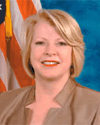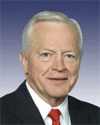| Jul. 07 | |
|
|
|
| |||||||||||||||||||||||||
| Presidential polls today: | (None) | |
||
| Dem pickups (vs. 2004): | CO IN IA MT NM OH VA | GOP pickups (vs. 2004): | (None) | |
News from the Votemaster
It is no secret that many conservatives do not like John McCain for his positions on immigration, campaign finance and global warming and they are determined to stop him from rewriting the party's platform to enshrine his ideas in it. If they follow through on this threat, it could disrupt the Republican convention and lead to a nasty platform fight. Democrats don't have a similar problem. The 2004 Democratic platform was 39 pages of mush but there is little in it that is controversial among Democrats. The platform committee will just remove the endless references to Kerry's war service and replace them with calls for change. Most of the planks will remain intact. Nobody ever reads the party platforms anyway, but activists are willing to draw blood to get them their way. It is probably the only aspect of American politics where ideas dominate.
Most of the media are fixated on the presidential race, but there are dozens of tight races going on in Congress that are well worth following. Each party has a plan to defend its most threatened members in the House and attack the other side's easiest kill. The Democrats' plan is called the Red to Blue Program and targets 18 open House seats currently held by Republicans as well as 20 sitting Republicans. The DCCC has $48 million cash on hand. If you do the arithmetic you get something like $1 million per race (which is a lot of money in a House race) with $10 million left over for emergencies and emerging opportunities.
The Republicans' plan is called ROMP-Regain Our Majority Program. In March, the first ten members were selected, seven incumbent Republicans needing help, two Republicans running for open Republican seats, and only one Republican (Anne Northup of KY-03) challenging a sitting Democrat. In June, ten more members were selected, all of them threatened Republicans.
Notice the immense asymmetry. The DCCC's chairman Chris Van Hollen is aggressively going after 38 Republican seats (20 of them occupied). The NRSC's Tom Cole has going after one Democratic seat, John Yarmuth in KY-03, and the latest poll there shows Yarmuth with a 17-point lead. In other words, Cole is husbanding his meager resources (about $6 million cash on hand) to fend off Van Hollen's attacks on vulnerable Republican incumbents. It is hard to see how the Republicans will regain the majority if they are going after only one Democrat--and he is securely in the saddle.
Today seven new competitive races have been added to the page containing our Hot House races. What makes a race competitive? In the absence of a lot of polling data, it is a subjective call based on the caller's knowledge and experience. Factors that are important include the 2006 results (any incumbent who won by 5% or less is in for a fight) and the district's PVI (after the MS-01 special election, any Republican in a district of R+5 or less has a problem), but also the strength of the candidates. For example, by all rights, any Democrat in an R+18 district ought to be in Tom Cole's gunsights, but President Bush's own congressman, nine-term Democrat Chet Edwards, is very popular in his district (TX-17) and is probably unbeatable. That said, here are the new additions to the Hot House races.
As usual with the House and Senate pages on this site, if you click on the picture, you go to the candidate's campaign page. If you click on the candidate's name, you go to his or her Wikipedia entry. If you click on (D) or (R), you go to the corresponding state party's home page.
AL-05
| Challenger | Challenger | Notes |

Parker Griffith (D) |

(R) |
Bud Cramer (D) is retiring. In theory, an open seat in an R+6 district ought to go to the Republican, but an open seat in nearby MS-01, which is even more Republican, just went to the Democrat by 8 points. Two Republicans are slugging it out in the primary, Wayne Parker and Cheryl Guthrie. If the former wins, lawn signs that just say "Parker" better have a party logo on them. |
CO-04
| Incumbent | Challenger | Notes |

Marilyn Musgrave (R) |

Betsy Markey (D) |
The battle of the blondes :-) Marilyn Musgrave was first elected to the House in 2002 when Rep. Bob Schaffer (R) retired (Schaffer is now running for the Senate). In 2006, she barely held on, winning by fewer than 6000 votes. The American Conservative Union rates Musgrave as the most conservative member of the House. She strongly opposes abortion, same-sex marriage, gun control. the whole nine yards. While her district is conservative (R+9), her state is not. Her big problem this time not so much her opponent, Betsy Markey, a former aide to Sen. Ken Salazar (D-CO), but the rest of the Democratic ticket. Barack Obama and Mark Udall are on top of the ticket and will ensure a huge Democratic turnout. Markey may well ride to victory on their coattails. The DCCC will be pumping money into this district like there is no tomorrow. Given Musgrave's outspoken views, expect fireworks. |
FL-24
| Incumbent | Challenger | Notes |

Tom Feeney (R) |

Suzanne Kosmas (D) |
Tom Feeney is a relatively young (50) and very conservative congressman and former speaker of the state house. He was very active in the battle to get George Bush's victory in Florida in 2000 certified quickly. His district is only R+3, and since the Democrats picked up R+5, R+7, and R+10 districts in special elections this Spring, he is a prime target. Furthermore, Feeney was involved in the Abramoff scandal. He was one of the three congressmen Abramoff flew to Scotland for golf outings. The other two are Bob Ney (who is now in prison for taking bribes) and Tom DeLay (who is under indictment). Feeney escaped in 2006 because he faced a little-known and underfunded challenger. Feeney's opponent this time is former state representative Suzanne Kosmas, who has the full (financial) backing of the DCCC, Emily's List, and other organizations. |
LA-06
| Incumbent | Challenger | Notes |

Don Cazayoux (D) |

(R) |
Earlier this year Don Cazayoux won this open seat in a special election. In November he has to defend it. In the special election, the Republicans threw the book at him, trying to tie him to Barack Obama and calling him "Don Tax-a-you." It didn't work. Now he is an incumbent. However, the Republican turnout will be stronger in the general election than it was in the special election. The Republicans are at a disadvantage, however, because they don't have a candidate yet and their primary isn't until Sept. 6 with a possible runoff Oct. 4. Meanwhile, Cazayoux gains stature as a sitting congressman. Nancy Pelosi fully understands his situation and is doling out favors to him all the time to make sure the LA-06 voters understand that a congressman in the majority can bring home more bacon than one in the minority. |
MS-01
| Incumbent | Challenger | Notes |

Travis Childers (D) |

Greg Davis (R) |
Travis Childers and Greg Davis have already faced off twice this year, first in a multicandidate primary election, then in a one-on-one runoff. Childers won both of them, the latter by 8 points. In November they go at it again. Although the district is heavily Republican, Childers has already demonstrated his ability to beat Davis in a head-to-head match, despite Davis bringing out the heavy artillery--Dick Cheney campaigned for him. It didn't work. Now that Childers is the incumbent and able to bring in goodies for the district, Davis will have an uphill climb. Merely calling him a "liberal" (which he is not by any stretch of the imagination) won't be enough. However, the larger Republican turnout in the general election might pull Davis over the line. A race to watch. |
MI-09
| Incumbent | Challenger | Notes |

Joe Knollenberg (R) |

Gary Peters (D) |
Michigan has been very hard hit economically and Republicans are going to take the brunt of it here. This district is R+0, so while Joe Knollenberg has been in Congress for eight terms, he is going to have to defend his party. Furthermore, at 74 Knollenberg is older than John McCain, surely to be an issue. His opponent is veteran and former state senator Gary Peters. Knollenberg got only 51% of the vote in 2006 and this time around DCCC chairman Chris Van Hollen has painted a large target on his back and plans to spend big time here to defeat him. |
MO-06
| Incumbent | Challenger | Notes |

Sam Graves (R) |

Kay Barnes (D) |
Sam Graves is a young (44) four-term congressman in a Republican (R+5) district. He faces his most formiddable challenge this time in the form of Kansas City, Missouri, mayor Kay Barnes, who is 70, but very popular in Kansas City, most of which is in the district. Barnes' playbook is taken from that of Sen. Claire McCaskill (D-MO), who made a big pitch to rural voters as well as city dwellers. This is a top-tier race, with DCCC Chairman Chris Van Hollen planning to spend generously to help Barnes. |
No new polls today due to the holiday weekend. Polling should be starting again today. However, Scott Rasmussen picked up a hot potato yesterday, the question of whether to normalize polling for partisan identification. Here's what that means in plain English. Rasmussen's polls of party identification have shown that averaged over the past few months about 9% more people call themselves Democrats than Republicans. Suppose he runs a poll of 1000 people and by chance gets 500 Democrats and 500 Republicans when he knows that among 1000 voters he should be getting 545 Democrats and 455 Republicans. One option is just to go with the raw data (i.e., not normalize it). The other one is to force the sample to be weighted to the Democrats by 9% by either calling more people and discarding Republicans until the right balance is achieved or by weighting each Democrat called as 1.045 and each Republican as 0.945. Pollsters differ vigorously on whether they should force the sample to conform to a particular partisan model and if so, which one. Gallup was widely criticized by other pollsters last time around for normalizing to a model that contained many more Republicans than they believed was justified by their data. For Rasmussen's column, click here.
-- The Votemaster
If you like this Website, tell your friends. You can also share by clicking an icon:
![]()
![]()
![]()
![]()
![]()
![]()
![]()
![]()